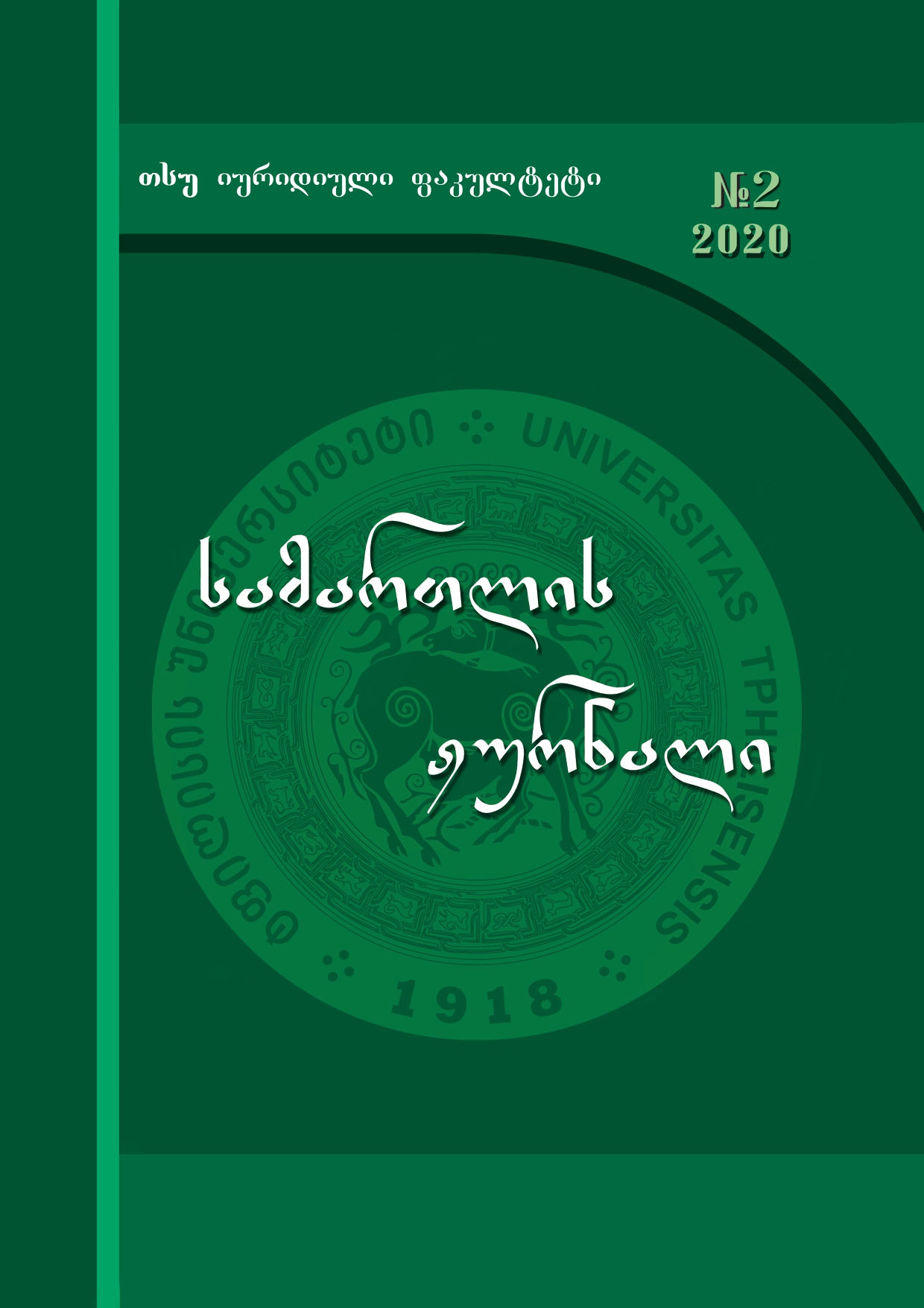იურიდიული პირის კონცეფციის ჩანასახი რომაულ სამართალში
DOI:
https://doi.org/10.48614/jlaw.2.2020.15-36საკვანძო სიტყვები:
ძველი რომის სამართალი, იურიდიული პირი, კონცეფცია, კორპორაცია societas, universitas, societas publicanorumანოტაცია
კომერციული გაერთიანებების ისტორიას უძველეს პერიოდამდე მივყავართ. იდეა იმისა, რომ ადამიანებს შეეძლოთ ეთანამშრომლათ, თავი მოეყარათ ქონებისათვის და ასე ეწარმოებინათ თავიანთი საქმიანობა, ჯერ კიდევ ყველაზე ადრეულ საზოგადოებებში არსებობდა. ამავდროულად არ იყო რეალურად არანაირი თეორიული საფუძველი ასეთი გაერთიანებებისათვის და არც იურიდიული პირის კონცეფცია იყო ჩამოყალიბებული. რომაული სამართალიც, მიუხედავად მისი უდავო კომპლექსურობისა და პროგრესული ინსტიტუტებისა, არ იცნობდა იურიდიულ პირის ცნებას, თუმცაღა თავისი მრავალსაუკონოვანი ისტორიის განმავლობაში ახლოს კი მივიდა მასთან. Universitas და societas publicanorum ამ მხრივ განსაკუთრებით მნიშნელოვანი ინსტიტუტებია. პირველი ინტერესის საგანს წარმოადგენს როგორც, გაერთიანებებთან მიმართებაში, რომაული სამართლებრივი ნააზრევის მწვერვალი და მეორე, როგორც დიდი მასშტაბების მქონე საზოგადოება, რომელშიც ზოგიერთი ავტორი თანამედროვე სააქციო საზოგადოების წინამორბედსაც ხედავს.
ზემოაღნიშნული ორი გაერთიანების გარდა, არსებობდა სხვა საზოგადოებებიც რომელთა მიმოხილვაც, ტიპებად დაყოფა და კლასიფიკაციაც მნიშვნელოვანია იმ ფაქტის ხაზგასასმელად, რომ, მიუხედავად იმისა, რომ რომაელებს არ ეკუთვნით იურიდიული პირის კონცეფციის ჩამოყალიბების პატივი, მათ დიდი წვლილი შეიტანეს ასეთი კონცეფციის ფორმირებაში და ამ წვლილის კვლევა აუცილებელია, არა მარტო სამართლის ისტორიის გადმოსახედიდან, არამედ იმისათვის, რომ უკეთ იქნას გააზრებული თანამედროვე იურიდიული პირიც.
წყაროები
Abatino B., Dari-Mattiacci G., Perotti E.C., Depersonalization of Business in Ancient Rome, Oxford Journal of Legal Studies, Vol. 31, № 2, 2011, 365-389.
Ankum H., Societas Omnium Bonorum and Dos in Classical Roman Law, Israel Law Review, Vol. 29, Issue 1-2, 1995, 106.
Aubet M. A., Commerce and Colonization in the Ancient Near East, Cambridge University Press, Cambridge, 2013, 339.
Ausbüttel F. M., Untersuchungen zu den Vereinen im Westen des Römischen Reiches, M. Laßleben, Kallmünz, 1982, 35, 49-98.
Badian E., Publicans and Sinners: Private Enterprise in the Service of the Roman Republic, Cornell University Press, Ithaca, New York, 1972, 73.
Balsdon J., Roman History, 65-50 B.C.: Five Problems. Journal of Roman Studies, Vol. 52, Issue 1-2, November 1962, 135.
Bauman R. A., Lawyers in Roman Transitional Politics: A Study of Relations between the Roman Jurists and the Emperors from Augustus to Hadrian, C.H. Beck‘sche Verlagsbuchhandlung, München, 1985, 32.
Berger A., Encyclopedic Dictionary of Roman Law, The American Philosophical Society, Philadelphia, 1953, 624, 709-710.
Berman H. J., Law and Revolution: The Formation of the Western Legal Tradition, Harvard University Press, Cambridge, 1983, 149-150, 215-216.
Birks P., The Roman Law of Obligations, Oxford University Press, Oxford, 2014, 118, 260.
Blackstone W., Commentaries on the Laws of England, Book I: Of the Rights of Persons, Prest W. (Ed.), Oxford University Press, Oxford, 2016, 304.
Broekaert W., Joining Forces: Commercial Partnerships or Societates in the Early Roman Empire, Historia: Zeitschrift für Alte Geschichte, Band 61, Heft 2, Stuttgart, 2012, 228, 230.
Brunt P. A., The 'Fiscus' and Its Development, The Journal of Roman Studies, Vol. 56, 1966, 85.
Buckland W. W., A Text-book of Roman law from Augustus to Justinian, Cambridge University Press, Cambridge, 1921, 176-177, 504, 505.
Crook J., Law and Life of Rome, Cornel University Press, Ithaca, New York, 1967, 206, 229, 231, 234-235.
Crowther N. B., The Collegium Poetarum at Rome: Fact and Conjecture, Latomus, Vol. 32, Issue 3, 1973, 575-560.
Cohn M., Zum Römischen Vereinsrecht: Abhandlungen aus der Rechtsgeschichte, Habilitationsschrift, Weidmannsche Buchhanglung, Berlin, 1873, 66-67.
Coing H., Europäisches Provatrecht, Band I: Älteres Gemeines Recht, C.H. Beck’sche Verlagsbuchhandlung, München, 1985, 465.
Duff P. W., Personality in Roman Private Law, Cambridge, Cambridge University Press, 1938, 1-25, 36, 37, 50, 55-58, 107, 112, 113-114, 129, 142, 149-150.
Elyashevych V., Legal Person, Its Origin and Functions in Roman Private Law, Saint-Petersburg, Schredder Typolitogtaphy, 1910, 65-95 (in Russian).
Felmeth A. X., Horwitz M., Guide to Latin in International Law, Oxford University Press, Oxford, 2009, 262.
Finley M. I., The Ancient Economy, University of California Press, Berkeley, 1999, 141.
Fleckner A. M., Antike Kapitalvereinungen, Ein Beitrag zu den konzeptionellen und historischen Grundlagen der Aktiengesellschaft, Böhlau Verlag GmbH & Cie, Köln, 2010, 35, 117, 127, 131, 145-215, 235-237, 336.
González J., Crawford M. H., The Lex Irnitana: A New Copy of the Flavian Municipal Law, The Journal of Roman Studies, Vol. 76, 1986, 172, 223-224.
Gruen E. S., The Last Generation of the Roman Republic, University of California Press, Berkeley, 1995, 230-231.
Hawk B., Law in Commerce in Pre-Industrial Societies, Brill – Nijhoff, Leiden, 2015, 230-233.
Hansmann H., Kraakmann R., Squire R., Incomplete Organizations: Legal Entities and Asset Partitioning in Roman Commerce, ECGI Working Paper Series in Law, Paper № 271/2014, October, 2014, 6, <https://papers.ssrn.com/sol3/papers.cfm?abstract_id=2506334> [15.11.2020].
Hansmann H., Kraakman R., Squire R., Law and the Rise of the Firm, Harvard Law Review, Vol. 119, 2005, 1360, 1362, 1363-1364
Harland P., Greco-Roman Associations: Texts, Translations, and Commentary, Vol. II: North Coast of the Black Sea, Asia Minor, De Gruyter, Berlin, 2014, 97.
Hausmanniger H., Selb W., Römisches Privatrecht, 6. Aufl., Böhlau Verlag, Wien, 1991, 139.
H. F. J., Review of Personality in Roman Private Law by P. W. Duff, The Cambridge Law Journal, Vol. 7, № 1, 1939, 160.
Hollander D. B., Money in the Late Roman Republic, Brill, Leiden, 2007, 49.
Kaser M., Roman Private Law, 4th Ed., Dannenbring R. (Trans.), University of South Pretoria, Pretoria, 1984, 93, 95-96.
Kaser M., Das Römische Privatrecht, Erster Abschnitt, C.H. Beck’sche Verlagsbuchhandlung, München, 1971, 605.
Khanna V., Business Organizations in India Prior to the British East India, in: Research Handbook on the History of Corporate and Company Law, Wells H. (Ed.), Edward Elgar Publishing, Cheltenham, 2018, 33-64.
Kharaishvili A., Interrelation Between the Piercing the Corporate Veil and Limited Liability Principles in Corporate Law, Journal of Law, №2, 2017, 123-128.
Laube D., Societas as Consensual Contract, The Cambridge Law Journal, Vol. 6, № 3, 1938, 382-383, 390.
Lehmann K., Die Geschichtliche Entwicklung des Aktienrechts bis zum Code de Commerce, Carl Heymanns Verlag, Berlin, 1895, 3-4.
Liu J., The Guilds of Textile Dealers in the Roman West, Brill, Leiden, 2009, 265-266.
Liu J., Professional Associations, in: The Cambridge Companion to Ancient Rome, Erdkamp P. (Ed.), Cambridge University Press, Cambridge, 2013, 356.
Machen A. W., Corporate Personality, Harvard Law Review, Vol. 24, №4, February, 1911, 255.
Malmendier U., Roman Shares, in: The Origins of Value: The Financial Innovations That Created Modern Capital Markets, Goetzmann W. N., Rouwenhorts K. G. (Eds.), Oxford University Press, Oxford, 2005, 36-40.
Malmendier U., Law and Finance "at the Origin", Journal of Economic Literature, Vol. 47, № 4, December 2009, 1079.
Malmendier U., Societas Publicanorum: Staatliche Wirtschaftsaktivitäten in den Händen privater Unternehmer, Böhlau Verlag GmbH, Köln, 2002, 31, 61-64, 91-116, 251-259, 261-268.
Mauss M., A Category of the Human Mind: The Notion of Person; The Notion of Self, Halls W. D. (Trans.), in: The Category of the Person: Anthropology, Philosophy, History, Carrithers M., Collins S., Lukes S. (Eds.), Cambridge University Press, Cambridge, 1985, 14-15.
Mouritsen H., Plebs and Politics in the Late Roman Republic, Cambridge University Press, Cambridge, 2001, 149-150.
Mousourakis G., Fundamentals of Roman Private Law, Springer Verlag, Berlin, 2012, 85.
Olivecrona K., Three Essays in Roman Law, Munksgaard, Copenhagen, 1949, 5, 17, 26-27.
Perry J. S., The Roman Collegia: The Modern Evolution of Ancient Concept, Brill, Leiden, 2006, 23-60.
Plutarch, Plutarch's Lives, Vol. I: Theseus and Romulus. Lycurgus and Numa. Solon and Publicola (Loeb Classical Library № 46), Perrin B. (Trans.) Harvard University Press, Cambridge, 1967, 365-367.
Poitras G., Geranio M., Trading of Shares in the Societates Publicanorum?, Explorations in Economic History, Vol. 61, July 2016, 97, 112-116.
Radin M., Fundamental Concepts of the Roman Law, California Law Review, Vol. 13, Issue 2, January 1925, 120.
Rüpke J., Collegia sacerdotum—Religiose Vereine in der Oberschicht.' in: Antike Vereine: Studien und Texte zu Antike und Christentum, Egelhaaf-Gaiser U., Schäfer A. (Eds.), Mohr Siebeck, Tübingen, 2002, 41–68.
Sano M., Collegia Through Their Funeral Activities: New Light on Sociability in the Early Roman Empire, Espacio Tiempo y Forma Serie II Historia Antigua, Issue 25, 2012, 393-414.
Schwind F., Römisches Recht. Teil 1: Geschichte. Rechtsgang. System des Privatrechtes, Springer Verlag, Wien, 1950, 323.
Seymour E. B., Jr., The Historical Development of the Common-Law Conception of a Corporation, The American Law Register (1898-1907), Vol. 51, № 9, Vol. 42 New Series, September, 1903, 530-531.
Sohm R., Institutionen des Romisches Recht, 17. Aufl., Duncker & Humblot, Berlin, 1949, 196, 208.
Spaak T., A Critical Appraisal of Karl Olivecrona’s Legal Philosophy, Springer Verlag, Stockholm, 2014, 222.
Speidel M. A., Roman Army Pay Scales, The Journal of Roman Studies, Vol. 82, November 1992, 87.
Thomas J., Textbook of Roman Law, North Holland, Amsterdam, 1976, 301, 470, 472, 473, 475.
Tomasic R., Bottomley S., McQueen R., Corporations Law in Australia, The Federation Press, Sydney, 2002, 44.
Venticinque P. F., Honor Among Thieves: Craftsmen, Merchants, and Associations in Roman and Late Roman Egypt, University of Michigan Press, Ann Harbor, 2016, 174-175.
Zimmermann R., The Law of Obligations: Roman Foundations of Civil Tradition, Oxford University Press, Oxford, 1996, 452, 454.
Zwalve W. J., Callistus's Case: Some Legal Aspects of Roman Business Activities, in: The Transformation of Economic Life under the Roman Empire, Proceedings of the Second Workshop of the International Network Impact of Empire (Roman Empire, c. 200 B.C. – A.D. 476), Nottingham, July 4-7, 2001, Blois L., Rich J. (Eds.), Amsterdam, 2001, 119.
Wieacker F., Haftungsformen des römischen Gesellschaftsrechts, Zeitschrift der Savigny-Stiftung für Rechtsgeschichte: Romanistische Abteilung (SZ), Band 54, Heft 1, Weimar, 1934, 35-79.
Littlewoods Mail Order Stores v. Inland Revenue Commissioners, [1969] 1 W.L.R. 1241 (A.C.) at 1254.
ჩამოტვირთვები
გამოქვეყნებული
როგორ უნდა ციტირება
გამოცემა
სექცია
ლიცენზია
საავტორო უფლებები (c) 2021 TSU Publishing House

ეს ნამუშევარი ლიცენზირებულია Creative Commons Attribution-ShareAlike 4.0 საერთაშორისო ლიცენზიით .









